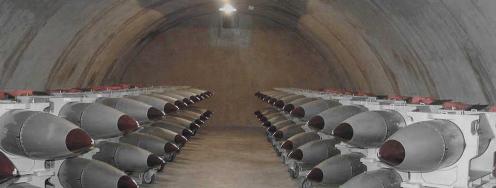Congress Moving New Sanctions on North Korea
On the radar: Sanctioning the highly sanctioned; Korb on nuclear arsenal, savings; Controlling the undefined; IAEA-Iran talks inconclusive; Iran’s magnet order; New reductions, tough sell; Interpreting the test, and WMD response capabilities in question.
On the radar: Sanctioning the highly sanctioned; Korb on nuclear arsenal, savings; Controlling the undefined; IAEA-Iran talks inconclusive; Iran’s magnet order; New reductions, tough sell; Interpreting the test, and WMD response capabilities in question.
February 14, 2013 | Edited by Benjamin Loehrke and Alyssa Demus
Punishing the hermit kingdom - The Senate Foreign Relations Committee is working on new legislation that calls for increased sanctions on North Korea in response to its recent nuclear test and longstanding human rights abuses. The bill also urges “all U.N. member states to increase efforts to prevent the export of military and dual-use technologies,” and establishes new reporting requirements. http://owl.li/hImQe
Bill text - Full text of the “North Korea Nonproliferation and Accountability Act of 2013” here. http://owl.li/hIlG9
Tweet - @ForeignPolicy: What to sanction for the country that already has all the sanctions? @columlynch's a sanction giving guide for NoKo. http://t.co/UdAAzC86
Nuclear reductions, budget savings - ”President Obama should push for a reduction [to 1,000-1,100 warheads], which would follow the practice of his predecessors and improve our national security,” writes Lawrence Korb at Think Progress. “Given the pressure that all government expenditures will face over the next decade due to our fiscal problems, maintaining our current oversized nuclear arsenal is unnecessary, unaffordable, and unwise.” http://owl.li/hItFa
Welcome to Early Warning - Subscribe to our morning email or follow us on twitter.
--Have a tip or feedback for the editor? Email earlywarning@ploughshares.org earlywarning@ploughshares.org. Want to support this work? Click here.
Nonstrategic weapons - The U.S. and Russia do not have a shared definition of what a “nonstrategic” or “tactical” nuclear weapon is, let alone compatible negotiating positions for how to control them. A new working paper from Hans Kristensen at the Federation of American Scientists explains the definitional problem and the outlook for controlling the bombs.
--Recommendation: If a new arms control treaty with Russia does not cover all nuclear warheads, an easier step might be for the two countries to first agree to verifiable limits on air-delivered nonstrategic nuclear weapons. (pdf) http://bit.ly/UiUjMU
IAEA talks - The most recent talks between Iran and the IAEA ended “inconclusively” earlier today. The agency’s inspectors were unable to finalize a document that would help resolve concerns of possible military dimensions of Iran’s program. Alan Colwell of The New York Times has the story. http://owl.li/hIkwu
Tweet - @james_acton32: Yonhap: Seoul says no nuclear radiation detected from North's nuke test. http://t.co/qraQ3jfZ
Attracting attention - Iran recently tried to purchase 100,000 magnets that could be used in uranium centrifuges, according to diplomats and experts. This announcement is concerning because it coincides with Iran’s recent procurement and installation of advanced centrifuge technology and hints at even greater expansion of Iran’s centrifuge program. Joby Warrick of the Washington Post has the story. http://owl.li/hInzd
Uphill battle - If Sen. Hagel’s nomination is any indication of the “partisan politics poisoning Washington,” a proposed round of nuclear reductions will be a tough sell with Congress, writes Walter Pincus of The Washington Post.
--”Just think of what any country would be like after being hit by just one or two nuclear weapons. That should make people wonder why we even need 1,000 of them, which is close to the new number the Obama administration is considering,” writes Pincus. Full story here. http://owl.li/hIrTl
No big deal - “As the United States again contemplates its Iran conundrum, it should eschew calls for a take-it-or-leave-it deal,” writes Ray Takeyh, arguing that offering such a deal might only compress the negotiating timeline and narrow U.S. options.
--“It would be prudent to have a sense of proportionality and appreciate that, in the end, time works best for the United States and not the economically beleaguered theocracy,” writes Takeyh. Full op-ed at The LA Times. http://lat.ms/Z087L5
Article - “Pyongyang's Nuclear Logic: Sometimes a Test is Just a Test” by Jennifer Lind, Keir Lieber and Daryl Press in Foreign Affairs. http://fam.ag/ZcWCnn
Perspective - “To the extent that the U.S. nuclear arsenal needs to be sized against another nation, that country is Russia, not North Korea. Washington and Moscow both maintain stockpiles of thousands of nuclear weapons...In contrast, North Korea, according to estimates, has less than ten. Tuesday’s test does not change that basic calculus,” writes Robert Golan-Vilella in The National Interest. http://bit.ly/YaNwki
Events:
--”The Korean Peninsula Issues.” Institute for Corean-American Studies. February 15, 1:00-4:30 p.m. @ Rayburn Office Building, Room B. http://owl.li/hr2Ag
--”Iran’s Nuclear Program: Is a Peaceful Solution Possible?” Amb. Thomas Pickering and Kenneth Pollack. February 19, 10:00-11:30 a.m. @ The Brookings Institution, Faulk Auditorium. Details here.http://owl.li/hCGQy
--”Nuclear Policy Challenges,” Joe Cirincione, President of Ploughshares Fund. February 19, 7:00-8:30 p.m. @ UW Milwaukee Institute of World Affairs. Details Here. http://owl.li/hCHz1
Longer read:
WMD response - The Obama administration’s strategic guidance to the military on WMDs is moving the military’s focus from incident response to prevention. This poses some issues, as lines of authority for how and when the military should respond to a WMD incident are often blurry. Sydney Freedberg at AOL Defense looks into the issue of WMD prevention and response. http://aol.it/YaW2zU



